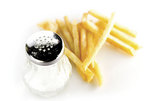Volunteers needed for salt intake study
 Science Science
Participants are needed for a new study investigating the effects of lowering salt intake on blood vessel function. PhD researcher Kacie Dickinson says the recommended salt intake for healthy Australians is 6 grams a day, or one teaspoon, but the reality is that most people consume between 8-12 grams a day, leaving them at greater risk of high blood pressure, strokes and heart attacks. "Processed foods are often loaded with salt and most Australians tend to add salt to their meals on top of this," said Ms Dickinson, from the University's Discipline of Physiology and CSIRO Food and Nutritional Sciences. Ms Dickinson is keen to recruit 60 overweight men and women, aged between 40 and 70 years, for a 12-week study to test the impacts of a low-sodium diet on blood vessels. They should not currently be taking any blood pressure medication. Participants will follow a salt-reduced diet for six weeks and a normal salt diet for the remaining six weeks, under supervision from a dietician. Earlier this year, Ms Dickinson and her colleagues from CSIRO and the University's Centre of Clinical Research Excellence (CCRE) in Nutritional Physiology Interventions and Outcomes published their findings of a previous study, which demonstrated the multiple benefits of salt reduction. The study measured the impact of salt restriction on the endothelium, the thin layer of cells that line the interior of the blood vessels and help regulate blood flow. "Results of this study published earlier this year show that there are benefits of salt reduction independently of blood pressure," Ms Dickinson said. "We have known for a long time that lowering salt intake can improve blood pressure but this was the first time it was shown to have a direct effect on blood vessel function." In this study, 29 overweight and obese participants with normal blood pressure who restricted their daily salt intake to between 3.5 and 7.5 grams of salt per day showed a 40% improvement in blood flow. The study, published earlier this year in the American Journal of Clinical Nutrition, warranted further investigation to confirm the findings, she said. People interested in taking part in this new study or seeking more information should contact Kacie Dickinson on +61 8 8303 8936 or email: kacie.dickinson@csiro.au Story by Candy Gibson
|





